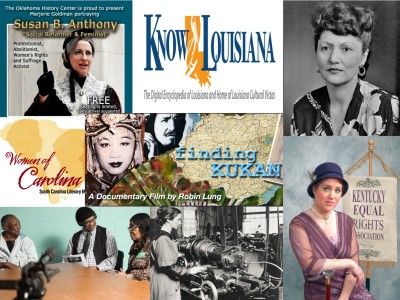Originating as a national celebration in 1981, Women’s History Month began as “Women’s History Week,” through legislation passed by Congress. According to womenshistorymonth.gov, a site hosted by The Library of Congress, throughout the early ’80s Congress continued to pass joint resolutions designating a week in March as Women’s History Week until the month of March was officially proclaimed “Women’s History Month” in 1987. To honor this designation, as well as to highlight the diverse women who helped form this nation, state humanities councils are creating and supporting programs that bring women’s history to life through film, theater, reading & discussion groups, living history presentations and oral history exhibits. Additionally, many state humanities councils have created articles for online encyclopedias detailing how women in their state contributed to and brought about local and national change. View the featured 2016 Women’s History Month programs.
Women’s History Month – Civil Rights, Equality, and War
From Alaska to Nebraska and Michigan to Hawaii, councils are using programs and grants to showcase women’s involvement and impact on the civil rights movement, connection to African-American history, and understanding of and involvement in war.
The Alaska Humanities Forum supported a documentary film with re-enactments, new interviews and rare historic footage and photographs to tell the story of Elizabeth Peratrovich, an Alaskan woman who became an unlikely hero in the fight for civil rights. Her testimony before the Alaska Territorial Senate in 1945 swayed the floor to vote in favor of the first civil rights bill passed in the U.S. since the Civil War, anticipating by 20 years the passage of the Civil Rights Act of 1964. In the Midwest, Humanities Nebraska is supporting the musical production and performance of Ain’t I A Woman celebrating four African-American women: “ex-slave and fiery abolitionist Sojourner Truth, renowned novelist and anthropologist Zora Neale Hurston, exuberant folk artist Clementine Hunter, and fervent civil rights worker Fannie Lou Hamer.” Michigan Humanities Council, through their Heritage Grants program, is supporting “Grandma’s Voices,” a multimedia project to create an oral history capturing African American women’s stories of life in Grand Rapids, MI from the 1940s, 50s and 60s.
In addition to fighting for civil rights and racial equality, women fought to serve their country and bring awareness of war issues to the political roundtable. As part of its Speakers Bureau program, Vermont Humanities is hosting an illustrated lecture by historian Carrie Brown that reveals the courage and hard work of the women who preceded cultural icon Rosie the Riveter. Hawaii Council for the Humanities is sponsoring the documentary film Finding KUKAN by Robin Lung, who details her journey to discover a Chinese-Hawaiian real-life heroine and who, in her search, stumbles upon the history and mystery of Li Ling-Ai, a Chinese American playwright from Hawaii who knew nothing about making movies, but who ended up making KUKAN, an “epic color film of China at war… that clearly depicted the brutality of the Japanese military machine against the citizens of China.” KUKAN premiered in 1941, was screened at the White House, and was used as a rallying point for those who wanted to sway public opinion toward U.S. involvement in the Chinese war. It became the first American feature length documentary film to earn an Academy Award, but was “lost” after World War II.
Women’s History Month – Votes for Women and the Feminist Movement
Across the country, councils are hosting, supporting and initiating programs and resources highlighting the fight for women’s suffrage. Through Speakers Bureaus, living history performances and one-person dramas, panel presentations and discussions, and online encyclopedia posts, councils demonstrate that there are endless ways to immerse oneself in the movement’s history. In Kentucky, as part of their Chautauqua program, the Kentucky Humanities Council features a living history performance, Votes for Women!, on the life of Madeline McDowell Breckinridge, who was both a state and national leader in the women’s suffrage movement. The North Dakota Humanities Council is supporting a series of panel discussions entitled Women’s Voices hosted at Dickinson State University throughout March. Each panel discussion features differing aspects of women’s history, including a student-panel discussion on Iron Jawed Angels, a historical film focusing on the American women suffrage movement during the 1910s. In Oklahoma, the humanities council is presenting a living history portrayal of social activist and education reformer, Susan B. Anthony, for high school students and then for the public. And in Louisiana, the Louisiana Endowment for the Humanities, in its online encyclopedia KnowLouisiana.org, features articles specifically about Louisianan history surrounding the women suffrage movement and the equal rights movements, often referred to as the “second wave” of feminism to separate it from the suffragette struggle.
To view the full list of programs relating to women and history, please click here.


